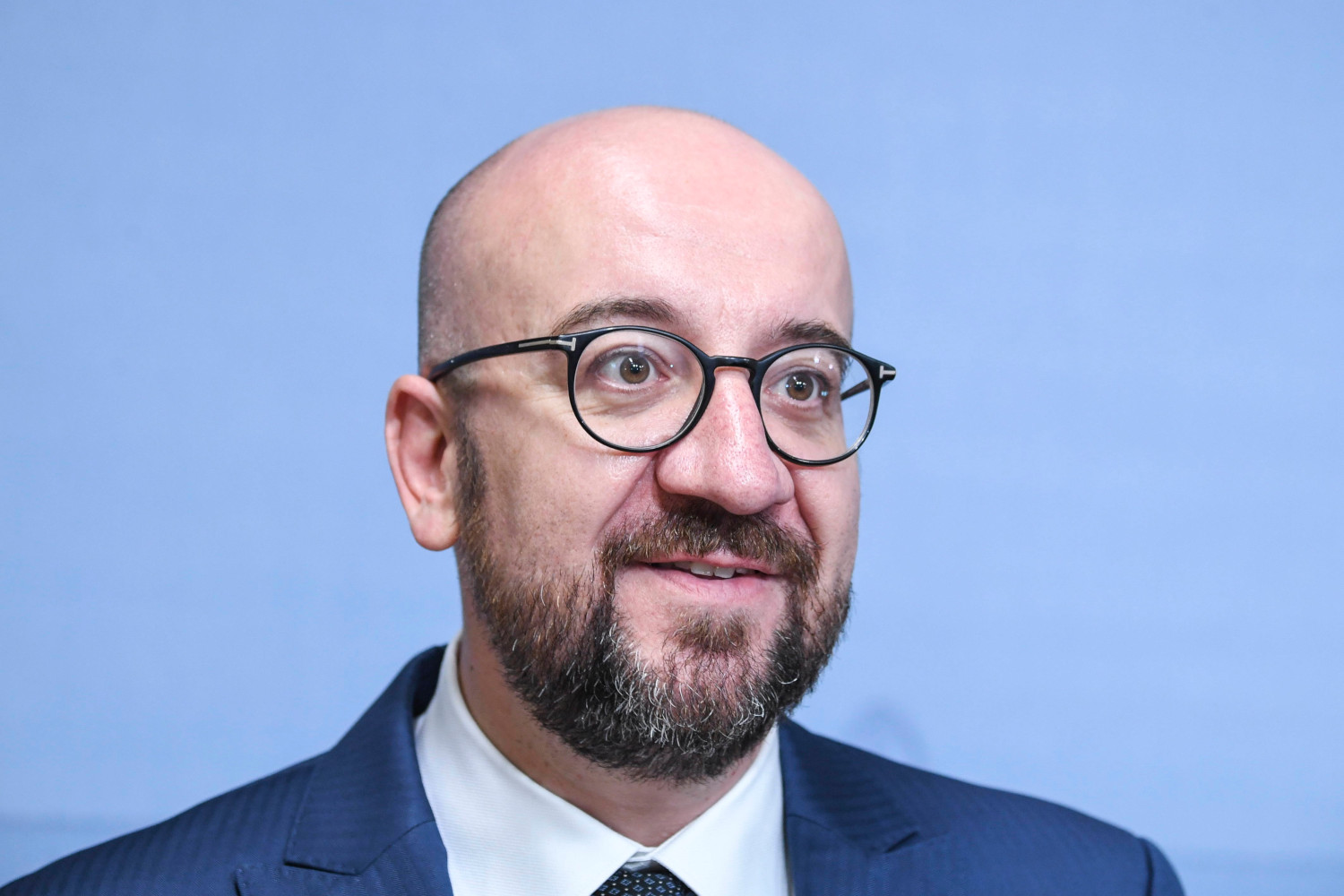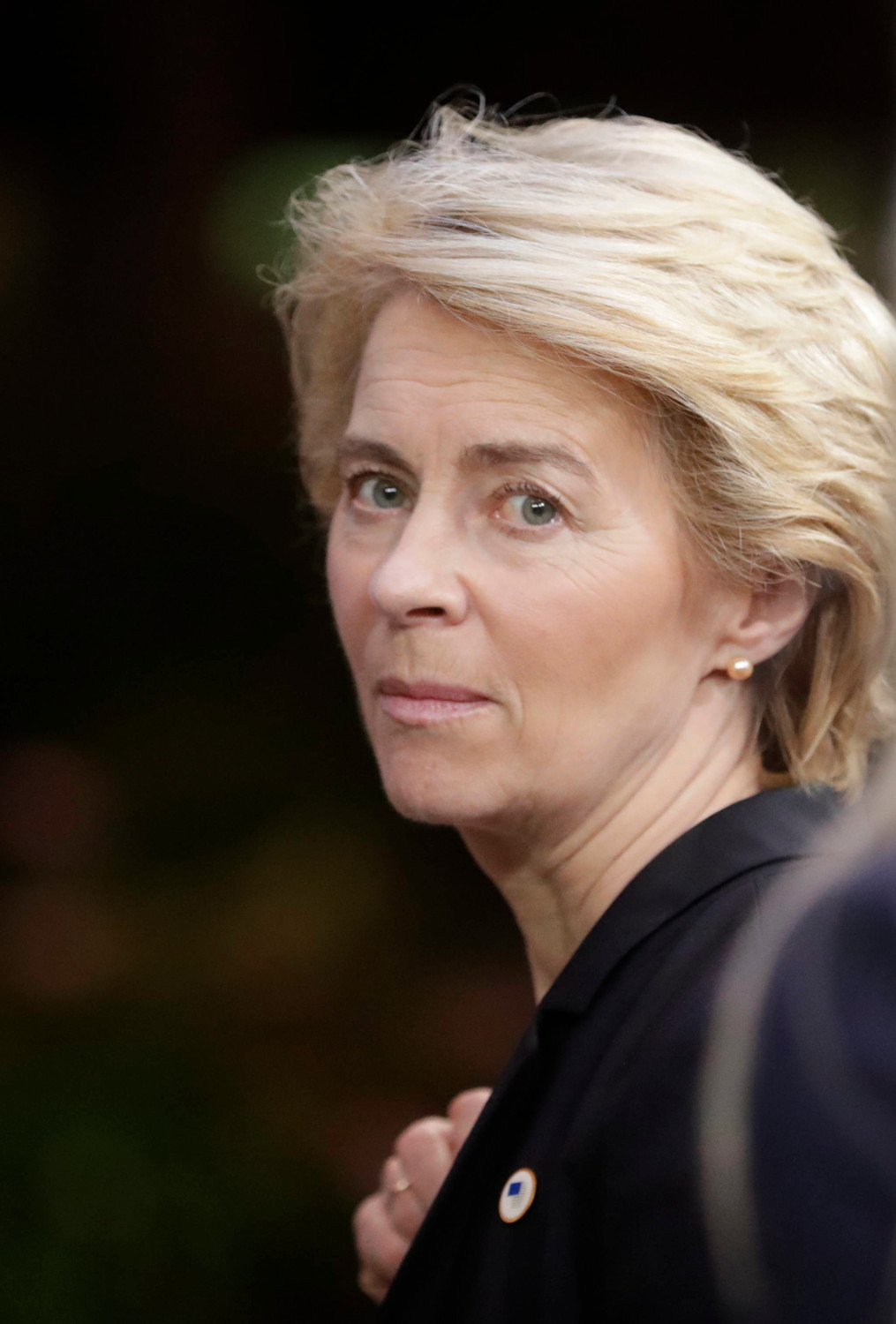THE WARSAW INSTITUTE REVIEW
Date: 4 November 2019 Author: Prof. Tomasz Grzegorz Grosse
2019 European Election and its Outcomes
This year’s elections to the European Parliament brought about a number of changes in the shape of EU policy. The most important of them is probably the shifting of the entire spectrum of Euro-enthusiastic forces to the left. Despite the high turnout and the awakened ambitions of MEPs, it quickly became clear that it is the Member States that continue to have the most to say on key issues such as filling the key EU posts. The problem is, therefore, that the intergovernmental logic in the EU dominates over the parliamentary one – and is even trying to use political factions in the European Parliament to pursue national interests.
 Charles Michel, President-elect of the European Council, Finland, October 14, 2019. © Kimmo Brandt (PAP/EPA)
Charles Michel, President-elect of the European Council, Finland, October 14, 2019. © Kimmo Brandt (PAP/EPA)EP election results
In the European election held in May 2019, the European People’s Party (EPP) won the most seats – 182, followed by the left-wing Socialists and Democrats (S&D) – 154. The third force in the EP is the Liberals (former ALDE, now ‘Renew Europe’) – 108 seats, and the fourth – Greens (75). The factions considered Eurosceptic will hold onto the following number of seats – Identity and Democracy (73), European Conservatives and Reformists Group (62), the 5 Star Movement and the Brexit Party (43), and the European United Left/Nordic Green Left (41)[1].
The elections revealed a very strong division between Euro-enthusiastic groups supporting the process of unification of EU countries, and Eurosceptic factions, critical of the integration processes and proposing an alternative direction of its development. These two separate groups dispute over the vision of European integration (more centralized and transnational versus the more decentralized and flexible – leaving more autonomy for nation-states), as well as European values (liberal and left-wing versus conservative and Christian Democratic).

In European Elections, the parties of the previous mainstream were the most successful. Eurosceptic groups, however, have increased their number of seats in the EP. In addition, the two largest mainstream parties, which so far, following the German model, having on numerous occasions formed a great coalition in the European Parliament, have significantly lost many seats they had had before. Both EPP and S&D have lost around 30 seats, respectively; together, they have lost nearly 70 MEPs. In both factions, the representation of German members significantly weakened. The consequence of the loss of these parties was that it was impossible to form a majority in the EP based on the two largest groups. In this way, the Euro-enthusiastic coalition intending to have the greatest influence on policy and legislation in European Parliament, had to seek support in two other formations: Renew Europe (the former Liberals) and the Greens. The mere fact of greater fragmentation in the Euro-enthusiastic camp translated into serious difficulties in filling the highest posts in the EP and in other institutions in the EU.
NEWSLETTER
An additional factor was the political plan of the French President Emmanuel Macron, who intended to weaken Germany’s position in the European institutions in these elections. Until now, the largest faction, the European People’s Party, has been a very effective tool for German politics. For many politicians and national parties, its meaning was more pragmatic than programmatic. Its influence is best reflected in the fact that after the previous elections in 2014 it filled not only the position of EP President (although only from 2017) but also all other key positions in the EU – the leadership of the European Commission (EC), the European Council and the High Representative of the Union for Foreign Affairs and Security Policy. The European People’s Party was known for its great discipline and enormous influence of the German Christian Democrats, and was therefore considered to be an instrument of influence for Chancellor Angela Merkel[2]. Therefore, it was sometimes referred to as the “vehicle” of German politics in the EU. In addition, the influence of this faction was complemented by an alliance with the Socialists and Democrats in the European Parliament. In this left-wing group, the main role was played by the German Social Democrats – associated with Merkel’s coalition in Germany. All of this gave Merkel significant influence and high effectiveness in politics at EU level.
Macron’s first goal was to weaken the position of Germany – above all, the “German vehicle” which was all about its domination of the European People’s Party in EU politics. Secondly, it was aimed at selecting its own vehicle to implement French political goals in the EU.
In effect, Macron managed to succeed in weakening the European People’s Party. Not only has it significantly reduced its previous EP influence, measured primarily by the number of MEPs, but, more importantly, it effectively weakened the right-wing rhetoric of EPP representatives. The intention of the conflict over Viktor Orban’s party (Fidesz) during the campaign and the suspension of rights of this political group was to show the pro-European nature of the European People’s Party and Manfred Weber’s uncompromising attitude towards defending European values. However, it has contributed to the EPP ceasing to refer to right-wing and conservative principles, while at the same time adopting liberal rhetoric on European values and, when it comes to chosen moral disputes, even taking on left-wing views. This not only reduced its electoral attractiveness for the right-wing electorate but also put left-wing and liberal politicians and liberals in ‘truly’ pro-European positions. It thus gave the electoral initiative to the Euro-enthusiastic left and the liberals, who were increasingly concentrated alongside Macron’s party. It is no coincidence that the new liberal faction was named ‘Renew Europe’ after the elections and that the dominant role in its ranks is played by politicians from the French party La République En Marche! (REM), now ruling in France. In addition, within the Socialist and Democrat party, the position of German Social Democrats weakened after the elections. Spanish Socialists, on the other hand, who are in close relations with the French president’s milieu, gained ground.
With these strategies, Macron was trying to build a strong leadership center for the future coalition of Euro-enthusiastic forces in the EP alongside the former liberal and socialist factions. At the same time, he wanted to weaken the previous political and programmatic significance of the European People’s Party. He sought, in consequence, to strengthen the French influence and weaken the German one in the EP, and, simultaneously, in the entire EU balance of power – because, at the moment, the post-election game also involved filling key positions in other EU bodies, not only in this institution.
Another consequence of these actions was a clear shift in the European mainstream towards the left and the liberal ideas. What was symptomatic for the whole formation was the case of the Polish Civic Platform (PO), which is one of the largest national parties forming the European People’s Party. Until the elections, it was part of a coalition with left-wing parties (including Democratic Left Alliance, Feminist Initiative, Polish Social Democracy, Freedom and Equality), which clearly shifted its electoral narration to the left-wing direction. At the same time, it weakened the European election result of the European People’s Party, as the political capital of the largest opposition party (PO) was divided into smaller groups, representatives of which also joined other factions in the EP. The Polish example is very characteristic of the shift of the Euro-enthusiastic mainstream towards the left.
 Josep Borrell, Nominee for the High Representative of the European Union for Foreign Affairs and Security Policy, Luxembourg, October 14, 2019. © Julien Warnand (PAP/EPA)
Josep Borrell, Nominee for the High Representative of the European Union for Foreign Affairs and Security Policy, Luxembourg, October 14, 2019. © Julien Warnand (PAP/EPA)Main results of the EP elections
Firstly, the elections weakened the mainstream right, the European People’s Party, which, by rhetorically approaching the left and the liberals, passed the domination in the EP to the Eurosceptic groups, the orientation of most of which is clearly conservative and Christian Democratic. This is a potentially significant opportunity for these groups in the long term. It may involve the expansion of influence in the electorate, namely occupying the arena formerly belonging to the groups forming the European People’s Party. This faction may become even smaller in the future or even fall apart. Moreover, the described changes may lead to a break with the stigmatization of “Eurosceptic” and “populist” groups in favor of terms referring to their Christianity, conservatism, or broadly understood right-wing ideas. The credibility of the new right-wing in the EP can be further enhanced by referring to a different vision of European integration from the one proposed so far by left-wing and liberal environments.
Secondly, we should expect that the political pressure from EP will be increasing – against countries which, in the opinion of left-wing circles, allegedly violate European values, although they often simply try to defend their own Christian and conservative agenda. This applies in particular to the dispute over the rule of law and other European values.
Moreover, the EP will probably seek to increase the scale of European redistribution (especially within the eurozone), introduce protectionist solutions, including those moving away from neoliberal solutions on the internal market, and intending to increase tax harmonization and minimum standards for social services across the EU.
In addition, it is to be expected that the ambitions in the area of climate policy will strengthen. This is related to the success of green groups in some Western European countries, mainly in Germany.
Furthermore, a stronger criticism of the USA and transatlantic relations are likely, especially during the period of Donald Trump’s administration. The countries that are too pro-American and are afraid of deepening cooperation in European defense policy so that it does not harm NATO’s role in Europe will also be stigmatized.
Besides, the EP’s position on Brexit and relations with the United Kingdom could be tightened up – serving, for instance, as a method of combating Euroscepticism ideologically. This will be at the expense of seeking the most pragmatic bilateral relations, for instance between the EU and the United Kingdom. This is all the more so as the EP elections in the UK also strengthened its position in favor of a tougher and uncompromising approach to the EU.
Additionally, a strong rivalry appeared in the European Parliament, not only between the Euro-enthusiastic mainstream and Eurosceptic groups, but also within the mainstream itself, especially between the “German bloc” and the “French bloc.” This situation was barely visible before. The Franco-German disputes and disagreements between their allies, have so far mainly occurred in intergovernmental institutions. Fractional disputes are currently being moved to the Council of the European Union and the European Council. National disputes, on the other hand, especially within two blocs centered around the dominant states, are now occurring in the EP, as evidenced by the blocking of the French candidate for the new Commission, Sylvie Goulard. The outcome of the latter is affecting the divisions within the mainstream. The logic of the dispute between France and Germany leads both sides to seeking allies in other EP factions or other countries – in intergovernmental institutions.
It should be noted, however, that the future of many substantive aspects of EU policies depends more on intergovernmental institutions policy than on political conditions in the EP. This means that national interests will be more important than the approaches of the European factions. Many disputes within intergovernmental institutions go beyond parliamentary divisions, for instance the one between Euro-enthusiasts vs. Eurosceptics, or between more left-wing or right-wing governments. The role of political groups in disputes within intergovernmental institutions will probably be even less important than it used to be before the 2019 elections. This is mainly caused by the weakening of the European People’s Party.
Support Us
If content prepared by Warsaw Institute team is useful for you, please support our actions. Donations from private persons are necessary for the continuation of our mission.
There is one very symptomatic example of all phenomena described. With regard to the future of the eurozone, the French and Spanish governments have clearly expressed their Euro-enthusiastic positions. The “Eurosceptic” Italian government also had similar expectations of increasing redistribution in the monetary union. On the other hand, the greatest skeptics of the French proposals and those supported by other countries of Southern Europe are the governments of Germany, the Netherlands, and the countries of Northern Europe, regardless of their political affiliation in the EP. The line of disagreement over reforms in the eurozone surpasses both division into euro-enthusiasts vs. Eurosceptics and membership of the EP’s political families (for example, the biggest opponent of the French proposals to reform the monetary union – Dutch Prime Minister Mark Rutte – belongs to the same political group in the EP as President Macron’s party, the group re-established by the French leader).
 Ursula von der Leyen, nominated President of the European Commission, Belgium, October 18, 2019. © Olivier Hoslet (PAP/EPA)
Ursula von der Leyen, nominated President of the European Commission, Belgium, October 18, 2019. © Olivier Hoslet (PAP/EPA)“Game of Thrones” at the EU
Power in the EU is based on the institutions, the filling of key functions in the EU structures, and the use of political factions from EP to pursue objectives at EU level. That is why the results of the EP elections and the related distribution of key posts in the EU institutions were so important. It turned out that France and Germany, as well as their national interests, are the most important players in the game for institutions.
On the formal level, the EP approves the candidacy of the head of the European Commission, and then the list of candidatures of the Commissioners of the institutions. It may also interview them and suggest changes to some of the most controversial proposals. Nevertheless, the Member States and the coalitions between them, and to a smaller extent the logic of the political factions, have the most significant influence on filling chosen EU posts.
The arguments relating to European elections were rather an additional support for these intergovernmental negotiations and an attempt to impose legitimacy-orientated logic, which was supposed to make the game easier for some countries. For example, Germany supported its candidate for the position of the head of the European Commission – Manfred Weber. The country based on the informal “Spitzenkandidat” mechanism, according to which the candidate of the largest group in the new European Parliament was to take up this position in the European Commission. Macron’s tactic was to discredit Weber (as incompetent, weak, and so on) and to disown the of “Spitzenkandidat” tradition, as a non-treaty one and as limiting European Council in its sovereign decisions. This is why prominent German politicians have accused Macron of not only being anti-German but also of destroying European democracy[3]. Furthermore, Macron tried to build an alternative to a “German vehicle,” i.e., the – European People’s Party (EPP) – the composition of EP factions that will question the EPP’s dominance in EU politics to date. It should be added that the European People’s Party has eight votes in the European Council, and the emerging outline of the left-liberal alliance – 15. However, this new “liberal vehicle” was only under construction and, therefore, did not have much meaning for the logic of the European Council designations. In this way, the fractional logic supported – if anything – Germany rather than France.
In the first phase of the dispute over the position of head of the European Commission, the “spitzenkandidat” of the European People’s Party (Manfred Weber) and the discredited candidates of other factions (Frans Timmermans, Margrethe Vestager) were lost. The French President even said that all three leading candidates had been eliminated[4]. Alternative applications were then examined, in particular the back-up EPP candidates. At the same time, there was a threat that the blockade of the German candidate might translate into a consistent blocking of the French for the most important positions.
In the second part of the negotiations, a Franco-German agreement was reached with the support of the Dutch and Spanish governments during the G20 summit in Osaka. It was based on the candidacy of the socialist Frans Timmermans as head of the Commission. In this way, the institution of the “leading candidate” was reactivated, although in a modified version matching the current political needs (the faction of Timmermans did not win the elections, so according to the original assumptions of the “spitzenkandidat” mechanism he should not take up the post of the head of the EC). This was conducted rather as a tribute of Angela Merkel for her coalition partner – German Social Democrats. It also aimed to break up the alliance between Renew Europe and Socialists and Democrats. In addition, the package provided for Weber’s transfer to the head of the EP for a full term of office. Some diplomats suggested that Timmermans’s proposal meant to be a failure from the very beginning and was intended to pave the way for the next negotiation deal[5]. Indeed, this agreement has been blocked by the Visegrad Group, Italy, and some countries linked to the European People’s Party, including Croatia and Latvia. This stage was marked by a rebellion in the ranks of the EPP and by the growing emancipation of Central Europe, which at this stage effectively stopped the candidacy of Timmermans, seen as unfavorable for the region. Moreover, Central Europe (particularly the Visegrád Group) was able to maintain its unity in very important negotiations – despite repeated attempts to break up their common front (for example Slovak PM belonged to the same European political family as Timmermans).
In the third stage, Ursula von der Leyen, considered to be closely related to Merkel, was proposed as the next candidate. To some degree surprising, this German nomination, as well as other accompanying nominations, received broad support from the European Council, including the countries of Central Europe. Something that was difficult or even impossible to push through at first, the German option in the Commission, became a fact in the third round of negotiations. Without the battle for Timmermans, there would not have been such a quick conclusion to the negotiations. This is undoubtedly a success for Germany and Merkel. France, however, won even more. Christine Lagarde will be President of the European Central Bank. Moreover, this is how the French led to the blocking of the German candidate Jens Weidmann, known for his criticism of Mario Draghi’s unconventional monetary policy. Lagarde will not only continue the monetary easing line of her predecessor but will also encourage European politicians to increase fiscal expansion in the event of another crisis. It is also possible that she will agree to finance this expansion within the framework of monetary policy. The success of Paris is also its nomination for two other posts. Spanish socialist Josep Borrell will take up the post of the High Representative of the Union for Foreign Affairs, while Charles Michel, a member of Renew Europe, will be the new President of the European Council.
Conclusions
Firstly, both the governing coalition in the EP and the arrangement of positions in the EU are proof of the post-election shift of the Euro-enthusiastic elites to the left. This marks the end of the era of dominance of EPP politicians in the EU institutions. It is also no coincidence that the candidacy of Timmermans – although controversial for Central Europe – has been put forward in relation to more general political processes in the EU. In addition, the new group of people at the top EU posts were enthusiastic about integration. For example, von der Leyen is in favor of the introduction of the ‘United States of Europe’ and the creation of a federal army for all Europeans[6].
Secondly, the post-election reality proves the superiority of the European Council and the logic of national interests in EU policy. Macron overthrew the “Spitzenkandidat” mechanism that had been respected since 2014 because he saw it as more conducive to German than French European goals. Although many politicians in the European Council referred to the results of the last elections and the mechanism of the “leading candidate,” these were arguments intended to push through their particular interests, and not the leading logic of making personnel decisions. The EP is rebellious, as evidenced by the rejection of the governments’ suggestions on the President of this institution. As a result, the candidacy of the only representative of Central Europe for a high office, a Bulgarian Sergei Stanishev, was lost. Moreover, the nomination of von der Leyen will probably lead to a reduction in the Commission’s autonomy towards intergovernmental institutions and thus increase the influence in EU policy of the largest Member States.
What is more, the key to power in the EU is filling key functions in its institutions as well as using political factions from the European Parliament to pursue objectives at EU level. It turned out that France and Germany, as well as their national interests, are the most important in the game of institutions. This confirmed the dominance of the Franco-German’ engine in the EU. However, there was also a visible competition between Paris and Berlin, and both countries were looking for allies, both in other countries and in other political families.
In addition, the new institutions are dominated by politicians from the western part of the continent. Indeed, Central Europe has stepped out of the shadows of Western Europe, blocking in solidarity the candidacy of Timmermans. However, this was only a partial success because the Dutch will be Vice-President of the new Commission. Moreover, the negotiation effort of Central Europe has not led to the introduction of its own representatives into the most important positions, but rather to the success of Germany and France. However, cooperation in this region is being increasingly translated into a common policy at EU level, which is likely to deepen in the future. Furthermore, the Franco-German disputes constitute an opportunity for the [Central European] region to pursue its own interests more effectively.
[1] 2019 European election results, European Parliament, https://www.election-results.eu/ [Accessed on: 27.06.2019].
[2] A. Barker, V. Mallet, G. Chazan, EU jobs race hit by Merkel – Macron friction, Financial Times, June 14, 2019, p. 9.
[3] J. Mischke, Senior MEP accuses Macron of being ‘anti-German’, Politico, 24.06.2019, https://www.politico.eu/article/senior-mep-accuses-emmanuel-macron-of-being-anti-german-daniel-caspary/ [Accessed on: 27.06.2019].
[4] D.M. Herszenhorn, F. Eder, M. de la Baume, R. Momtaz, J. Barigazzi, How Merkel’s plan for EU top jobs fell apart, Politico, 1.07.2019, https://ww.politico.eu/article/how-angela-merkel-plan-for-eu-top-jobs-fell-apart-spitzenkandidat-summit/ [accessed on 27.07.2019].
[5] A. Barker, M. Khan, Timmermans emerges as favorite to take over from Juncker, Financial Times, 29 June – 30 June 2019, s. 4.
[6] Z. Weise, Ursula von der Leyen: In her own words, Politico, 4.07.2019, https://www.politico.eu/ [Accessed on 27.07.2019].
All texts published by the Warsaw Institute Foundation may be disseminated on the condition that their origin is credited. Images may not be used without permission.














